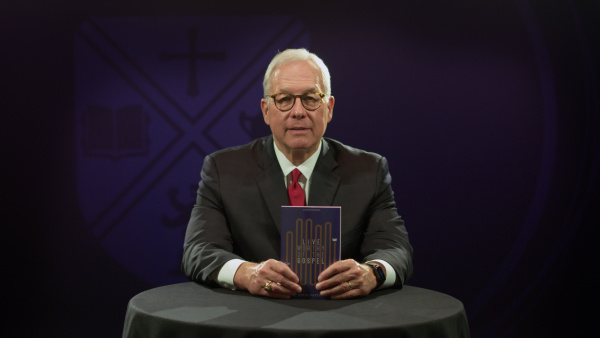PHILIPPIANS 2:1–2
If there be therefore any consolation in Christ, if any comfort of love, if any fellowship of the Spirit, if any bowels and mercies, fulfill ye my joy, that ye be likeminded, having the same love, being of one accord, of one mind.
One of the most famous trios of leaders in history was the First Triumvirate of Roman politicians Pompey, Crassus and Julius Caesar. Although they formed an alliance, each had personal ambition, not joint success, supremely in mind. For a few years in the 50s B.C. they combined forces, but their political cohesion unraveled into outright rivalry and civil war. Eventually, Caesar crossed the Rubicon and defeated Pompey at Pharsalus. These men were similar in their aspirations for glory, but history bears the evidence that they did not share a unified mindset. Allies became enemies.
Disunity has destroyed countless teams, companies, churches and homes. Perhaps you are familiar with a church that has suffered severely from selfish division. The sign in front of the church building professed the Gospel, but the relationships inside failed to apply it. Very few things hinder the advance of the Gospel as much as a disunified church or home.
Paul said the first aspect of living worthy of the Gospel was the Philippians’ external relationship to the world by their standing fast and cooperating together to advance the Gospel in the face of opposition (1:27–30). He goes on in the first two verses of Philippians 2 to address the second aspect of living worthy of the Gospel — an internal unity within the body of the church, and he commands them to be like-minded. With this exhortation, Paul more fully explains what he meant by contending for the Gospel “in one spirit, with one mind” (1:27). In order to live in a manner worthy of the Gospel, we have to pursue unity with fellow believers.
This call to unity was directly applicable to the Philippian church. When Epaphroditus told him about the condition of the Philippian church, Paul became deeply concerned about the brewing conflict between two ladies, Euodias and Syntyche, two of his co-laborers in the ministry (4:2). By this exhortation to unity, Paul responds to the disruption and potential division in the church because of the unresolved conflict.
The Reasons for Unity
PHILIPPIANS 2:1–2
If there be therefore any consolation in Christ, if any comfort of love, if any fellowship of the Spirit, if any bowels and mercies, fulfill ye my joy.
WORD STUDY
Consolation — comfort; encouragement; solace
Comfort — consolation
Fellowship — close relationship; participation; communion
Bowels — inward affection; kindness; sympathy
Mercies — pity; compassion; longings; manifestations of pity
Christian unity is impossible without spiritual motivation and divine enablement. Therefore, Paul not only commands the Philippian believers to be like-minded but also provides several reasons. First of all, Paul bases his appeal on a theological premise — the unity among the Father, the Son and the Holy Spirit. Paul mentions both Christ and the Spirit explicitly, and God the Father is implicit in the reference to “any comfort of love” (2:1). Although three distinct persons comprise the Trinity, there is only one God. These three persons experience a perfect unity.
Secondly, during their sufferings in Philippi, the believers shared the same spiritual blessings that flowed from their common relationship with the Trinity. The first phrase, “consolation in Christ,” refers to the comfort and encouragement we have as saints “in Christ Jesus” (1:1). The second phrase, “comfort of love,” speaks of God’s consoling love for His people who often face pressure, as did the Philippians. The third phrase, “fellowship of the Spirit,” signifies that the Holy Spirit indwells us and brings us into communion with the triune God. The final phrase, “bowels and mercies,” depicts God’s undeserved and tender compassion for the church, like a mother for her newborn baby.
The word any precedes each of these phrases. In other words, Paul grounds his appeal for unity in the spiritual blessings the Philippians knew to be true. If the persons of the Trinity are unified and work together for the benefit of God’s suffering children, shouldn’t those children possess and express the same unity in their relationships with each other in the body of the church?
Thirdly, Paul commands like-mindedness for the completion of his own joy. Does his command sound selfish? It shouldn’t when we understand God’s overarching intent in this letter to the Philippians. For all believers of all time, God put Paul on display as the Christlike model of joyful Christian maturity. Paul is our paradigm — our standard of joy. (The word joy appears 16 times in this epistle.) True joy is not the result of easy circumstances, so Paul rejoiced in a variety of contexts (4:10–13). Joy is focused on God’s glory, so Paul’s joy could not be complete if the church whom he dearly loved was not thriving in gospel unity for Christ’s sake.
The Essence of Unity
PHILIPPIANS 2:2
. . . that ye be likeminded, having the same love, being of one accord, of one mind.
WORD STUDY
Like-minded — to think; to ponder; to be of the same mind; to feel
Love — charity; benevolence; brotherly love
One accord — united in spirit; harmonious
Paul reveals that true joy is found in the Lord (4:4) and in His work in the world. One way the Lord cultivates joy among believers is through the unity of Christian brotherhood. Paul declares that his spiritual cup of joy will overflow if the Philippian believers are like-minded. “Behold, how good and how pleasant it is for brethren to dwell together in unity!” (Ps. 133:1). The essence of unity is like-mindedness.
What exactly is like-mindedness? Clearly, it is not an agreement of opinion on all facets of life. In another context, Paul speaks positively of both Christians who eat for God’s glory and Christians who abstain from eating for God’s glory (Rom. 14:5–6). When a church today is renovating its auditorium, it is okay to differ on whether the new carpet should be gray or beige as long as God is the one they are most concerned about! Nor does like-mindedness describe a group of believers who all look alike, dress alike, or talk alike. That state is called uniformity. Rather, like-mindedness has to do with the dispositions that foster unity and the decisions we make because of these attitudes.
Paul describes this unity with four phrases in Philippians 2:2 — “(1) be likeminded, (2) having the same love, (3) being of one accord, (4) of one mind.” The first and fourth phrases use similar wording with a slight variation: the first phrase means “to think the same;” the fourth means “to think the one.” Combining these ideas, we are “to like-mindedly mind the one thing.” The phrase “being of one accord” means “to be of the same soul,” referring to the inner man. These phrases, however, do not fully capture Paul’s meaning.
The key to understanding like-mindedness is found in the phrase “having the same love.” That phrase doesn’t mean that all Christians should like the same things. Whether you prefer Mac or PC or neither is irrelevant when it comes to Christian unity. Rather, we should have the same love for one another. Unity is possible — and necessary — regardless of our differences in age or ethnicity or background. We manifest this attitude of unity when we love one another with a selfless, sacrificial love. “And above all these things put on charity (love), which is the bond of perfectness” (Col. 3:14). Love is the glue that holds God’s people together, and spiritual unity is the byproduct of believers within the church body who love each other.
It is of utmost importance that we participate in the advance of the Gospel by living worthy of our heavenly citizenship. This manner of life requires unity found in like-mindedness. And this mindset is possible because we are fellow participants in God’s gracious salvation. Our Father has promised to finish the good work He has begun in us (Phil. 1:6) — a corporate building project that brings diverse sinners into loving unity with God and one another for the sake of the Gospel.
This post is from Live Worthy of the Gospel: A Study in Philippians by Steve Pettit. Copyright 2016 by BJU Press. Printed by permission of BJU Press.
This post is part of the study designed to correspond with the 2020 Fall Chapel Series. Watch the chapel message below:
Join us for chapel via live webcast at 11 a.m. every Monday and Wednesday.








